- Home
- Frederick Douglass
My Bondage and My Freedom (Penguin Classics) Page 9
My Bondage and My Freedom (Penguin Classics) Read online
Page 9
CHAPTER II.
The Author Removed from His First Home.
THE NAME “OLD MASTER” A TERROR—COLONEL LLOYD’S PLANTATION—WYE RIVER—WHENCE ITS NAME—POSITION OF THE LLOYDS—HOME ATTRACTION—MEET OFFERING—JOURNEY FROM TUCKAHOE TO WYE RIVER—SCENE ON REACHING OLD MASTER’S—DEPARTURE OF GRANDMOTHER—STRANGE MEETING OF SISTERS AND BROTHERS—REFUSAL TO BE COMFORTED—SWEET SLEEP.
That mysterious individual referred to in the first chapter as an object of terror among the inhabitants of our little cabin, under the ominous title of “old master,” was really a man of some consequence. He owned several farms in Tuckahoe ; was the chief clerk and butler on the home plantation of Col. Edward Lloyd ; had overseers on his own farms ; and gave directions to overseers on the farms belonging to Col. Lloyd. This plantation is situated on Wye river—the river receiving its name, doubtless, from Wales, where the Lloyds originated. They (the Lloyds) are an old and honored family in Maryland, exceedingly wealthy. The home plantation, where they have resided, perhaps for a century or more, is one of the largest, most fertile, and best appointed, in the state.
About this plantation, and about that queer old master—who must be something more than a man, and something worse than an angel—the reader will easily imagine that I was not only curious, but eager, to know all that could be known. Unhappily for me, however, all the information I could get concerning him but increased my great dread of being carried thither—of being separated from and deprived of the protection of my grandmother and grandfather. It was, evidently, a great thing to go to Col. Lloyd’s ; and I was not without a little curiosity to see the place ; but no amount of coaxing could induce in me the wish to remain there. The fact is, such was my dread of leaving the little cabin, that I wished to remain little forever, for I knew the taller I grew the shorter my stay. The old cabin, with its rail floor and rail bedsteads up stairs, and its clay floor down stairs, and its dirt chimney, and windowless sides, and that most curious piece of workmanship of all the rest, the ladder stairway, and the hole curiously dug in front of the fire-place, beneath which grandmammy placed the sweet potatoes to keep them from the frost, was MY HOME—the only home I ever had ; and I loved it, and all connected with it. The old fences around it, and the stumps in the edge of the woods near it, and the squirrels that ran, skipped, and played upon them, were objects of interest and affection. There, too, right at the side of the hut, stood the old well, with its stately and skyward-pointing beam, so aptly placed between the limbs of what had once been a tree, and so nicely balanced that I could move it up and down with only one hand, and could get a drink myself without calling for help. Where else in the world could such a well be found, and where could such another home be met with? Nor were these all the attractions of the place. Down in a little valley, not far from grandmammy’s cabin, stood Mr. Lee’s mill, where the people came often in large numbers to get their corn ground. It was a water-mill ; and I never shall be able to tell the many things thought and felt, while I sat on the bank and watched that mill, and the turning of that ponderous wheel. The mill-pond, too, had its charms ; and with my pin-hook, and thread line, I could get nibbles, if I could catch no fish. But, in all my sports and plays, and in spite of them, there would, occasionally, come the painful foreboding that I was not long to remain there, and that I must soon be called away to the home of old master.
I was A SLAVE—born a slave—and though the fact was incomprehensible to me, it conveyed to my mind a sense of my entire dependence on the will of somebody I had never seen ; and, from some cause or other, I had been made to fear this somebody above all else on earth. Born for another’s benefit, as the firstling of the cabin flock I was soon to be selected as a meet offering to the fearful and inexorable demigod, whose huge image on so many occasions haunted my childhood’s imagination. When the time of my departure was decided upon, my grandmother, knowing my fears, and in pity for them, kindly kept me ignorant of the dreaded event about to transpire. Up to the morning (a beautiful summer morning) when we were to start, and, indeed, during the whole journey—a journey which, child as I was, I remember as well as if it were yesterday—she kept the sad fact hidden from me. This reserve was necessary ; for, could I have known all, I should have given grandmother some trouble in getting me started. As it was, I was helpless, and she—dear woman!—led me along by the hand, resisting, with the reserve and solemnity of a priestess, all my inquiring looks to the last.
The distance from Tuckahoe to Wye river—where my old master lived—was full twelve miles, and the walk was quite a severe test of the endurance of my young legs. The journey would have proved too severe for me, but that my dear old grandmother—blessings on her memory !—afforded occasional relief by “toting” me (as Marylanders have it) on her shoulder. My grandmother, though advanced in years—as was evident from more than one gray hair, which peeped from between the ample and graceful folds of her newly-ironed bandana turban—was yet a woman of power and spirit. She was marvelously straight in figure, elastic, and muscular. I seemed hardly to be a burden to her. She would have “toted” me farther, but that I felt myself too much of a man to allow it, and insisted on walking. Releasing dear grandmamma from carrying me, did not make me altogther independent of her, when we happened to pass through portions of the somber woods which lay between Tuckahoe and Wye river. She often found me increasing the energy of my grip, and holding her clothing, lest something should come out of the woods and eat me up. Several old logs and stumps imposed upon me, and got themselves taken for wild beasts. I could see their legs, eyes, and ears, or I could see something like eyes, legs, and ears, till I got close enough to them to see that the eyes were knots, washed white with rain, and the legs were broken limbs, and the ears, only ears owing to the point from which they were seen. Thus early I learned that the point from which a thing is viewed is of some importance.
As the day advanced the heat increased ; and it was not until the afternoon that we reached the much dreaded end of the journey.3 I found myself in the midst of a group of children of many colors ; black, brown, copper colored, and nearly white. I had not seen so many children before. Great houses loomed up in different directions, and a great many men and women were at work in the fields. All this hurry, noise, and singing was very different from the stillness of Tuckahoe. As a new comer, I was an object of special interest ; and, after laughing and yelling around me, and playing all sorts of wild tricks, they (the children) asked me to go out and play with them. This I refused to do, preferring to stay with grandmamma. I could not help feeling that our being there boded no good to me. Grandmamma looked sad. She was soon to lose another object of affection, as she had lost many before. I knew she was unhappy, and the shadow fell from her brow on me, though I knew not the cause.
All suspense, however, must have an end ; and the end of mine, in this instance, was at hand. Affectionately patting me on the head, and exhorting me to be a good boy, grandmamma told me to go and play with the little children. “They are kin to you,” said she ; “go and play with them.” Among a number of cousins were Phil, Tom, Steve, and Jerry, Nance and Betty.
Grandmother pointed out my brother PERRY, my sister SARAH, and my sister ELIZA, who stood in the group. I had never seen my brother nor my sisters before ; and, though I had sometimes heard of them, and felt a curious interest in them, I really did not understand what they were to me, or I to them. We were brothers and sisters, but what of that? Why should they be attached to me, or I to them? Brothers and sisters we were by blood ; but slavery had made us strangers. I heard the words brother and sisters, and knew they must mean something ; but slavery had robbed these terms of their true meaning. The experience through which I was passing, they had passed through before. They had already been initiated into the mysteries of old master’s domicile, and they seemed to look upon me with a certain degree of compassion ; but my heart clave to my grandmother. Think it not strange, dear reader, that so little sympathy of feeling existed between us. The cond
itions of brotherly and sisterly feeling were wanting—we had never nestled and played together. My poor mother, like many other slave-women, had many children, but NO FAMILY ! The domestic hearth, with its holy lessons and precious endearments, is abolished in the case of a slave-mother and her children. “Little children, love one another,” are words seldom heard in a slave cabin.
I really wanted to play with my brother and sisters, but they were strangers to me, and I was full of fear that grandmother might leave without taking me with her. Entreated to do so, however, and that, too, by my dear grandmother, I went to the back part of the house, to play with them and the other children. Play, however, I did not, but stood with my back against the wall, witnessing the playing of the others. At last, while standing there, one of the children, who had been in the kitchen, ran up to me, in a sort of roguish glee, exclaiming, “Fed, Fed ! grandmammy gone ! grandmammy gone !” I could not believe it ; yet, fearing the worst, I ran into the kitchen, to see for myself, and found it even so. Grandmammy had indeed gone, and was now far away, “clean” out of sight. I need not tell all that happened now. Almost heart-broken at the discovery, I fell upon the ground, and wept a boy’s bitter tears, refusing to be comforted. My brother and sisters came around me, and said, “Don’t cry,” and gave me peaches and pears, but I flung them away, and refused all their kindly advances. I had never been deceived before ; and I felt not only grieved at parting—as I supposed forever—with my grandmother, but indignant that a trick had been played upon me in a matter so serious.
It was now late in the afternoon. The day had been an exciting and wearisome one, and I knew not how or where, but I suppose I sobbed myself to sleep. There is a healing in the angel wing of sleep, even for the slave-boy ; and its balm was never more welcome to any wounded soul than it was to mine, the first night I spent at the domicile of old master. The reader may be surprised that I narrate so minutely an incident apparently so trivial, and which must have occurred when I was not more than seven years old ; but as I wish to give a faithful history of my experience in slavery, I cannot withhold a circumstance which, at the time, affected me so deeply. Besides, this was, in fact, my first introduction to the realities of slavery.
CHAPTER III.
The Author’s Parentage.
AUTHOR’S FATHER SHROUDED IN MYSTERY—AUTHOR’S MOTHER—HER PERSONAL APPEARANCE—INTERFERENCE OF SLAVERY WITH THE NATURAL AFFECTIONS OF MOTHER AND CHILDREN—SITUATION OF AUTHOR’S MOTHER—HER NIGHTLY VISITS TO HER BOY—STRIKING INCIDENT—HER DEATH—HER PLACE OF BURIAL.
If the reader will now be kind enough to allow me time to grow bigger, and afford me an opportunity for my experience to become greater, I will tell him something, by-and-by, of slave life, as I saw, felt, and heard it, on Col. Edward Lloyd’s plantation, and at the house of old master, where I had now, despite of myself, most suddenly, but not unexpectedly, been dropped. Meanwhile, I will redeem my promise to say something more of my dear mother.
I say nothing of father, for he is shrouded in a mystery I have never been able to penetrate. Slavery does away with fathers, as it does away with families. Slavery has no use for either fathers or families, and its laws do not recognize their existence in the social arrangements of the plantation. When they do exist, they are not the outgrowths of slavery, but are antagonistic to that system. The order of civilization is reversed here. The name of the child is not expected to be that of its father, and his condition does not necessarily affect that of the child. He may be the slave of Mr. Tilgman ; and his child, when born, may be the slave of Mr. Gross. He may be a freeman ; and yet his child may be a chattel. He may be white, glorying in the purity of his Anglo-Saxon blood ; and his child may be ranked with the blackest slaves. Indeed, he may be, and often is, master and father to the same child. He can be father without being a husband, and may sell his child without incurring reproach, if the child be by a woman in whose veins courses one thirty-second part of African blood. My father was a white man, or nearly white. It was sometimes whispered that my master was my father.
But to return, or rather, to begin. My knowledge of my mother is very scanty, but very distinct.4 Her personal appearance and bearing are ineffaceably stamped upon my memory. She was tall, and finely proportioned ; of deep black, glossy complexion ; had regular features, and, among the other slaves, was remarkably sedate in her manners. There is in “Prichard’s Natural History of Man,” the head of a figure—on page 157—the features of which so resemble those of my mother, that I often recur to it with something of the feeling which I suppose others experience when looking upon the pictures of dear departed ones.
Yet I cannot say that I was very deeply attached to my mother ; certainly not so deeply as I should have been had our relations in childhood been different. We were separated, according to the common custom, when I was but an infant, and, of course, before I knew my mother from any one else.
The germs of affection with which the Almighty, in his wisdom and mercy, arms the helpless infant against the ills and vicissitudes of his lot, had been directed in their growth toward that loving old grandmother, whose gentle hand and kind deportment it was the first effort of my infantile understanding to comprehend and appreciate. Accordingly, the tenderest affection which a beneficent Father allows, as a partial compensation to the mother for the pains and lacerations of her heart, incident to the maternal relation, was, in my case, diverted from its true and natural object, by the envious, greedy, and treacherous hand of slavery. The slave-mother can be spared long enough from the field to endure all the bitterness of a mother’s anguish, when it adds another name to a master’s ledger, but not long enough to receive the joyous reward afforded by the intelligent smiles of her child. I never think of this terrible interference of slavery with my infantile affections, and its diverting them from their natural course, without feelings to which I can give no adequate expression.
I do not remember to have seen my mother at my grandmother’s at any time. I remember her only in her visits to me at Col. Lloyd’s plantation, and in the kitchen of my old master. Her visits to me there were few in number, brief in duration, and mostly made in the night. The pains she took, and the toil she endured, to see me, tells me that a true mother’s heart was hers, and that slavery had difficulty in paralyzing it with un-motherly indifference.
My mother was hired out to a Mr. Stewart, who lived about twelve miles from old master’s, and, being a field hand, she seldom had leisure, by day, for the performance of the journey. The nights and the distance were both obstacles to her visits. She was obliged to walk, unless chance flung into her way an opportunity to ride ; and the latter was sometimes her good luck. But she always had to walk one way or the other. It was a greater luxury than slavery could afford, to allow a black slave-mother a horse or a mule, upon which to travel twenty-four miles, when she could walk the distance. Besides, it is deemed a foolish whim for a slave-mother to manifest concern to see her children, and, in one point of view, the case is made out—she can do nothing for them. She has no control over them ; the master is even more than the mother, in all matters touching the fate of her child. Why, then, should she give herself any concern? She has no responsibility. Such is the reasoning, and such the practice. The iron rule of the plantation, always passionately and violently enforced in that neighborhood, makes flogging the penalty of failing to be in the field before sunrise in the morning, unless special permission be given to the absenting slave. “I went to see my child,” is no excuse to the ear or heart of the overseer.
One of the visits of my mother to me, while at Col. Lloyd’s, I remember very vividly, as affording a bright gleam of a mother’s love, and the earnestness of a mother’s care.

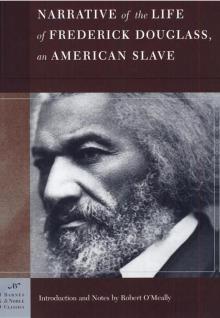 Narrative of the Life of Frederick Douglass: An American Slave
Narrative of the Life of Frederick Douglass: An American Slave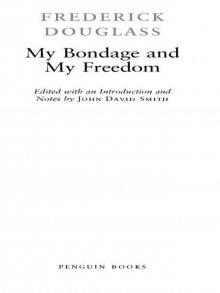 My Bondage and My Freedom
My Bondage and My Freedom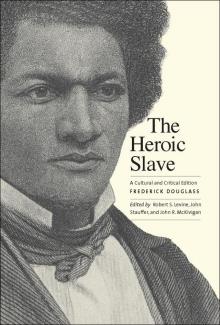 Two Slave Rebellions at Sea
Two Slave Rebellions at Sea The Color Line in America
The Color Line in America The Negro Exodus from the Gulf States
The Negro Exodus from the Gulf States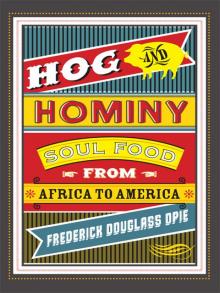 Hog and Hominy: Soul Food From Africa to America
Hog and Hominy: Soul Food From Africa to America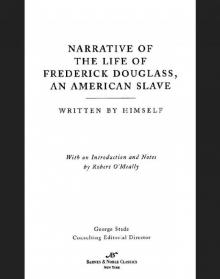 Narrative of the Life of Frederick Douglass
Narrative of the Life of Frederick Douglass![An Appeal to Congress for Impartial Suffrage [a machine-readable transcription] Read online](http://i1.bookreadfree.com/i/03/23/an_appeal_to_congress_for_impartial_suffrage_a_machine-readable_transcription_preview.jpg) An Appeal to Congress for Impartial Suffrage [a machine-readable transcription]
An Appeal to Congress for Impartial Suffrage [a machine-readable transcription] The Color Line
The Color Line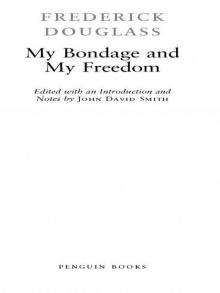 My Bondage and My Freedom (Penguin Classics)
My Bondage and My Freedom (Penguin Classics)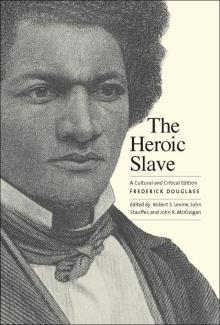 The Heroic Slave
The Heroic Slave